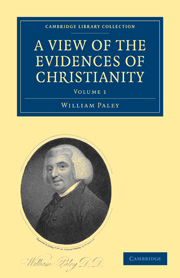Book contents
- Frontmatter
- HONOURABLE AND RIGHT REVEREN
- PREPARATORY CONSIDERATIONS
- PART I OF THE DIRECT HISTORICAL EVIDENCE OF CHRISTIANITY, AND WHEREIN IT IS DISTINGUISHED FROM THE EVIDENCE ALLEGED FOR OTHER MIRACLES
- CHAPTER I
- CHAPTER II
- CHAPTER III
- CHAPTER IV
- CHAPTER V
- CHAPTER VI
- CHAPTER VII
- CHAPTER VIII
- CHAPTER IX
- SECTION I
- SECTION II
- SECTION III
- SECTION IV
- SECTION V
- SECTION VI
- SECTION VII
- SECTION VIII
- SECTION IX
- SECTION X
- SECTION XI
- CHAPTER X
- CHAPTER I
- Frontmatter
- HONOURABLE AND RIGHT REVEREN
- PREPARATORY CONSIDERATIONS
- PART I OF THE DIRECT HISTORICAL EVIDENCE OF CHRISTIANITY, AND WHEREIN IT IS DISTINGUISHED FROM THE EVIDENCE ALLEGED FOR OTHER MIRACLES
- CHAPTER I
- CHAPTER II
- CHAPTER III
- CHAPTER IV
- CHAPTER V
- CHAPTER VI
- CHAPTER VII
- CHAPTER VIII
- CHAPTER IX
- SECTION I
- SECTION II
- SECTION III
- SECTION IV
- SECTION V
- SECTION VI
- SECTION VII
- SECTION VIII
- SECTION IX
- SECTION X
- SECTION XI
- CHAPTER X
- CHAPTER I
Summary
Recapitulation
The reader will now be pleased to recollect, that the two points which form the subject of our present discussion, are, first, that the Founder of Christianity, his associates, and immediate followers, passed their lives in labours, dangers, and sufferings; secondly, that they did so, in attestation of the miraculous history recorded in our Scriptures, and solely in consequence of their belief of the truth of that history.
The argument, by which these two propositions have been maintained by us, stands thus:
No historical fact, I apprehend, is more certain, than that the original propagators of Christianity voluntarily subjected themselves to lives of fatigue, danger, and suffering, in the prosecution of their undertaking. The nature of the undertaking; the character of the persons employed in it; the opposition of their tenets to the fixed opinions and expectations of the country in which they first advanced them; their undissembled condemnation of the religion of all other countries; their total want of power, authority, or force; render it in the highest degree probable that this must have been the case. The probability is increased, by what we know of the fate of the Founder of the institution, who was put to death for his attempt; and by what we also know of the cruel treatment of the converts to the institution, within thirty years after its commencement: both which points are attested by Heathen writers, and, being once admitted, leave it very incredible that the primitive emissaries of the religion, who exercised their ministry, first, amongst the people who had destroyed their Master, and, afterwards, amongst those who persecuted their converts, should themselves escape with impunity, or pursue their purpose in ease and safety.
- Type
- Chapter
- Information
- A View of the Evidences of ChristianityIn Three Parts, pp. 303 - 310Publisher: Cambridge University PressPrint publication year: 2009First published in: 1794

